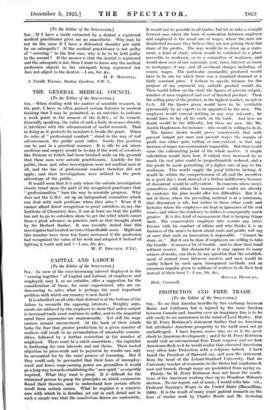CAPITAL AND LABOUR
[To the Editor of the SPECTATOR.] Siu,—In view of the ever-increasing interest displayed in the coming together " of Capital and Labour, of employers and employed, may I, as an outsider, offer a suggestion for the consideration of those, far more experienced, who are en- deavouring to solve what is perhaps the most important problem with which our country is now faced?
It is admitted on all sides that distrust is at the bottom of the failure to reconcile the opposing interests. Weighty argu, meats are adduced by the employer to show that unless output is increased trade must continue to suffer, and to the impartial mind these arguments are unanswerable. Yet still the wage earners remain unconvinced. At the back of their minds lurks the fear that greater production by a given number of workers will result in an accumulation of unsaleable commo- dities, followed by a further restriction in the number of employed. There must be a catch somewhere ; the capitalist is furthering his own interests and not theirs. Their rooted objection to piece-work and to payment by results can only be accounted for by the same process of reasoning. But if they could only be persuaded that their fears of unemploy- ment and lower wage-earning power are groundless it would go a long way towards establishing the " new spirit " so urgently required. What they want is proof. It is difficult for the untrained person to grasp the principles on which economists found their theories, and to understand how certain effects result from certain causes. What he requires is a concrete case with which he is familiar, set out in such detail and in such a simple way that the conclusions drawn are undeniable. It would not be possible in all trades, but let us take a straight forward case where the bone of contention between employer and employed is the usual one of wages, where the men are dissatisfied because they believe they are not getting their fair share of the profits. The way would be to draw up a state. meat, a kind of chart, which would be exhibited in a place accessible to workmen, or to a committee of workmen, and would show cost of raw materials, rent, rates, interest on loans or mortgages, if any, and all overhead charges including, of course, wages. The particular commodity produced would- have to be one for which there was a standard demand at a fairly constant price. I forbear to specify because for the purpose of my argument any suitable product would do. Then would follow on the chart the figures of present output, number of men employed and cost of finished product. Then the selling price of the product, in the highest market, on rail or f.o.b. All the figures given would have to be verifiable. (presumably by an expert) to be appointed by the men. The employer would conceal nothing in any way relevant ; he would have to lay all his cards on the table. And here no doubt would be the difficulty, but there are men—like Mr.' Austin Hopkinson, for instance—who would be willing to do it.
The figures shown would prove conclusively that with present output per man and present wages the margin of profit was either quite trifling or non-existent, so that any increase of wages was economicaly impossible. But then would come the culminating point of the whole matter. A simple calculation would show how, if output were increased by so much, the cost price could be proportionately reduced, and a fair profit be made permitting of a higher rate of pay to the workman. This would supply the proof hitherto lacking, it would be within the comprehension of all, and the incentive to a good day's work instead of a listless indifference because of discontent would be self-evident. In concerns where men's committees with whom the management confer are already in existence the plan would offer few difficulties. But it is not in these, where the prevailing mistrust is at a minimum, that discontent is rife, but rather in those other yards and factories where the employees are kept in ignorance of the real issues, and where the tendency to strikes is consequently much greater. It is this kind of management that is keeping things back. The conservative employer who resents any inter- ference with his conduct of affairs and who thinks it is no business of the men's to know about costs and profits will say at once that such an innovation is impossible. " Cannot be done, sir." But it can be done if employers are willing to take the trouble—it means a lot of trouble—and to show their hand without reserve. But distasteful as it may appear to many owners of works, can there be any question that the establish- ment of mutual trust between masters and men would be vastly helped by such open, transparent methods, and an enormous impulse given to Millions of workers to do their best instead of their least ?—I am, Sir, &c.,


































































 Previous page
Previous page